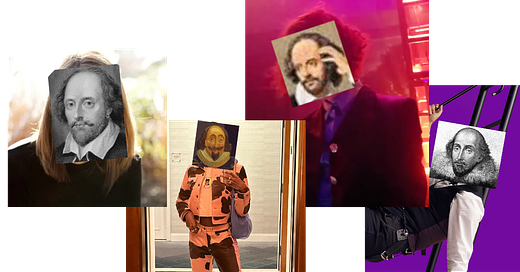who are shakespeares of our times?? 🖊️🎭🔮
I don't give a f about Shakespeare — but I am curious who would be this generation's version of that. Walk with me as we explore.
Want to find out which creatives could be the 2000s equivalent of Shakespeare? Then you gotta pay for it. Sorry, babe!
I was at a little literary event recently—and had a revelation.
There were many British persons and persons from the United Kingdom and, if there’s one thing I’ve learned from being abroad, it’s that people from the UK know their literary stuff which is also to say they will name drop the Bible and make you feel dumb. It’s an interesting approach to relating to people! And sometimes it yields some interesting factoids.
For example: did you know that Shakespeare wasn’t the most popular artist of his time? This came up in a discussion of a 17th century poem, which I had observed had remarkably contemporary language, which I didn’t necessarily attribute to this time period (which Shakespeare overlapped with, born in 1564 and dying in 1616). I imagined more flowery and, uhh, obnoxious language being of-the-time which got us talking about how Shakespeare’s works were a bit common at the time, which got me thinking about the idea of groundlings and his being a commoner’s form of entertainment — which I hadn’t intellectually thought about in quite some time. (Does that make me like him more? Not at all. I’m very give-me-the-new and most things before my lifetime I’m bored to tears by.) (SO SUE ME!!!)
And it’s true: he was beloved but not necessarily high-brow. He was common media. The British Council explains, via some of his peers thoughts on his work —
One mid-17th century commentary on Hamlet is found in Abraham Wright’s notebook (now held at the British Library). Wright criticised Hamlet as 'an indifferent [mediocre] play, the lines but mean [average].' Wright went so far as to claim that the gravedigger scene in Hamlet was 'since bettered in The Jealous Lovers', a play by Thomas Randolph that few people today have heard of. Wright did, however, enjoy Othello, which he deemed 'a very good play', and particularly liked the parts of 'villainous' Iago and 'jealous' Othello.
One of the earliest commentaries we have on Shakespeare comes from Gabriel Harvey, a scholar and writer, who noted in the margins of one of his books that 'the younger sort take much delight in Shakespeare’s Venus and Adonis; but his Lucrece and his tragedy of Hamlet, Prince of Denmark, have it in them to please the wiser sort'.
These notes also show us that Shakespeare originally became popular as a poet, not a playwright. To many early readers, Shakespeare was known not as a distinguished dramatist, but as a poet, whose most important works were The Rape of Lucrece, Venus and Adonis, and the Sonnets.
This is all very interesting, especially within the context of this newsletter and my job of monitoring the times and trends: given Shakespeare’s commonality, leaning to the young and common (while also the more esteemed), who will be seen as “our Shakespeare” in four hundred years, the same amount of time between now and the British writer’s time? Let’s investigate.
First, we have to agree on something: what is the modern equivalent to a poet/playwright today?
I don’t think the modern Shakespeare would be a literal poet/playwright as those mediums don’t translate in the same way. To be a poet/playwright in the 1600s was to be using a medium of-a-time, in that persons like Shakespeare were of a vanguard considering the newness of printed texts: printed matter were quite cutting edge for the time. Those who were getting published can be viewed as those who were successes in the medium who were tapping into a tool of burgeoning popularity while still dabbling in the accessible, as live performances were available to everyone (hence penny entry tickets).
For a comp, let’s think about the dawn of television in the late forties and early fifties, when TV sets went from niche item to household object. Who was famous then and what did they do? Who are we still talking about now? What is their creative butterfly effect? Who of these persons have had an endurance, who are still talked about today? And, if television and entertainment are the mediums, whose impact outside of the industry has been folded into the industry, either as their work or as their being a public figure? This gets at a more modern metric, in that someone didn’t have to be a television person to profit from idea-sharing via this medium. These are people who worked to propel ideas, reflect their times, and log history.
That leads us to a few ideas of people. These are not all “the same” as I tried to go for the most diverse set of potential candidates possible. It’s a good exercise too, considering who will transcend their time to last “forever”! So. Those people are…
Keep reading with a 7-day free trial
Subscribe to The Trend Report™ to keep reading this post and get 7 days of free access to the full post archives.






